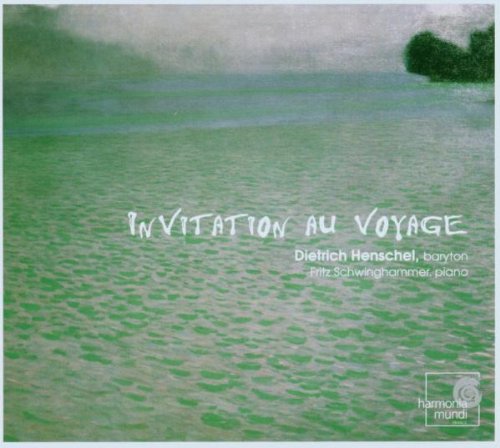Invitation au Voyage - Dietrich Henschel
A German’s VW cycle is a highlight along this pan-European song tour
View record and artist detailsRecord and Artist Details
Composer or Director: (Marie Eugène) Henri Duparc, Gustav Mahler, Ralph Vaughan Williams, Ildebrando Pizzetti
Genre:
Vocal
Label: Harmonia Mundi
Magazine Review Date: 9/2006
Media Format: CD or Download
Media Runtime: 70
Mastering:
Stereo
DDD
Catalogue Number: HMC90 1875

Tracks:
| Composition | Artist Credit |
|---|---|
| Songs of Travel |
Ralph Vaughan Williams, Composer
Dietrich Henschel, Baritone Fritz Schwinghammer, Piano Ralph Vaughan Williams, Composer |
| Lieder eines fahrenden Gesellen, 'Songs of a Wayfarer' |
Gustav Mahler, Composer
Dietrich Henschel, Baritone Fritz Schwinghammer, Piano Gustav Mahler, Composer |
| (3) Sonetti del Petrarca |
Ildebrando Pizzetti, Composer
Dietrich Henschel, Baritone Fritz Schwinghammer, Piano Ildebrando Pizzetti, Composer |
| (L')Invitation au voyage |
(Marie Eugène) Henri Duparc, Composer
(Marie Eugène) Henri Duparc, Composer Dietrich Henschel, Baritone Fritz Schwinghammer, Piano |
| (La) Vague et la cloche |
(Marie Eugène) Henri Duparc, Composer
(Marie Eugène) Henri Duparc, Composer Dietrich Henschel, Baritone Fritz Schwinghammer, Piano |
| Extase |
(Marie Eugène) Henri Duparc, Composer
(Marie Eugène) Henri Duparc, Composer Dietrich Henschel, Baritone Fritz Schwinghammer, Piano |
| Phidylé |
(Marie Eugène) Henri Duparc, Composer
(Marie Eugène) Henri Duparc, Composer Dietrich Henschel, Baritone Fritz Schwinghammer, Piano |
| (Le) Manoir de Rosemonde |
(Marie Eugène) Henri Duparc, Composer
(Marie Eugène) Henri Duparc, Composer Dietrich Henschel, Baritone Fritz Schwinghammer, Piano |
| Soupir |
(Marie Eugène) Henri Duparc, Composer
(Marie Eugène) Henri Duparc, Composer Dietrich Henschel, Baritone Fritz Schwinghammer, Piano |
Author: Patrick O'Connor
The first German baritone to record Vaughan Williams’s Songs of Travel? Only in the occasional over-stressed syllable does Dietrich Henschel betray that English is not his first language. He and Fritz Schwinghammer bring the most attractive, romantic feeling to ‘Let beauty awake’ and the other reflective songs. Those devoted to Bryn Terfel’s account, or the John Shirley-Quirk (always my favourite), might consider Henschel a little soft-edged but on the whole I found it a convincing and satisfying interpretation.
In mood and style, with the strong influence of folksong, these 1904 settings have much in common with Mahler’s Songs of a Wayfarer from 20 years earlier and the two cycles make a fine contrast. We are more accustomed to hearing the Mahler with orchestra, but with piano accompaniment the singer can attempt more inward-looking effects. In particular, the opening of ‘Ging heut’ morgen über’s Feld’ benefits: while the piano part suggests the distant echo of the church bells, Henschel uses an exquisite mezza-voce at the words ‘Und da fing im Sonnenschein’.
The three Pizzetti Petrarch songs are intriguing. I can only find reference to one other recording of this early group by a composer whose music remains too little known. The middle song, ‘Quel rossignol che si soave’, is especially beautiful, laments from the ‘third circle’ providing the bridge to the group of mélodies by Duparc. Henschel over-emphasises some of the ‘e’ endings but he is a fine actor, so the dramas of ‘La vague et la cloche’ and ‘Le manoir de Rosemonde’ suit him perhaps more than the dreamy soliloquies of ‘Phidylé’ and ‘Extase’.
This four-language recital is something of a tour de force; the recording is excellent, with a sensible balance between voice and piano.
In mood and style, with the strong influence of folksong, these 1904 settings have much in common with Mahler’s Songs of a Wayfarer from 20 years earlier and the two cycles make a fine contrast. We are more accustomed to hearing the Mahler with orchestra, but with piano accompaniment the singer can attempt more inward-looking effects. In particular, the opening of ‘Ging heut’ morgen über’s Feld’ benefits: while the piano part suggests the distant echo of the church bells, Henschel uses an exquisite mezza-voce at the words ‘Und da fing im Sonnenschein’.
The three Pizzetti Petrarch songs are intriguing. I can only find reference to one other recording of this early group by a composer whose music remains too little known. The middle song, ‘Quel rossignol che si soave’, is especially beautiful, laments from the ‘third circle’ providing the bridge to the group of mélodies by Duparc. Henschel over-emphasises some of the ‘e’ endings but he is a fine actor, so the dramas of ‘La vague et la cloche’ and ‘Le manoir de Rosemonde’ suit him perhaps more than the dreamy soliloquies of ‘Phidylé’ and ‘Extase’.
This four-language recital is something of a tour de force; the recording is excellent, with a sensible balance between voice and piano.
Discover the world's largest classical music catalogue with Presto Music.

Gramophone Digital Club
- Digital Edition
- Digital Archive
- Reviews Database
- Full website access
From £8.75 / month
Subscribe
Gramophone Full Club
- Print Edition
- Digital Edition
- Digital Archive
- Reviews Database
- Full website access
From £11.00 / month
Subscribe
If you are a library, university or other organisation that would be interested in an institutional subscription to Gramophone please click here for further information.




